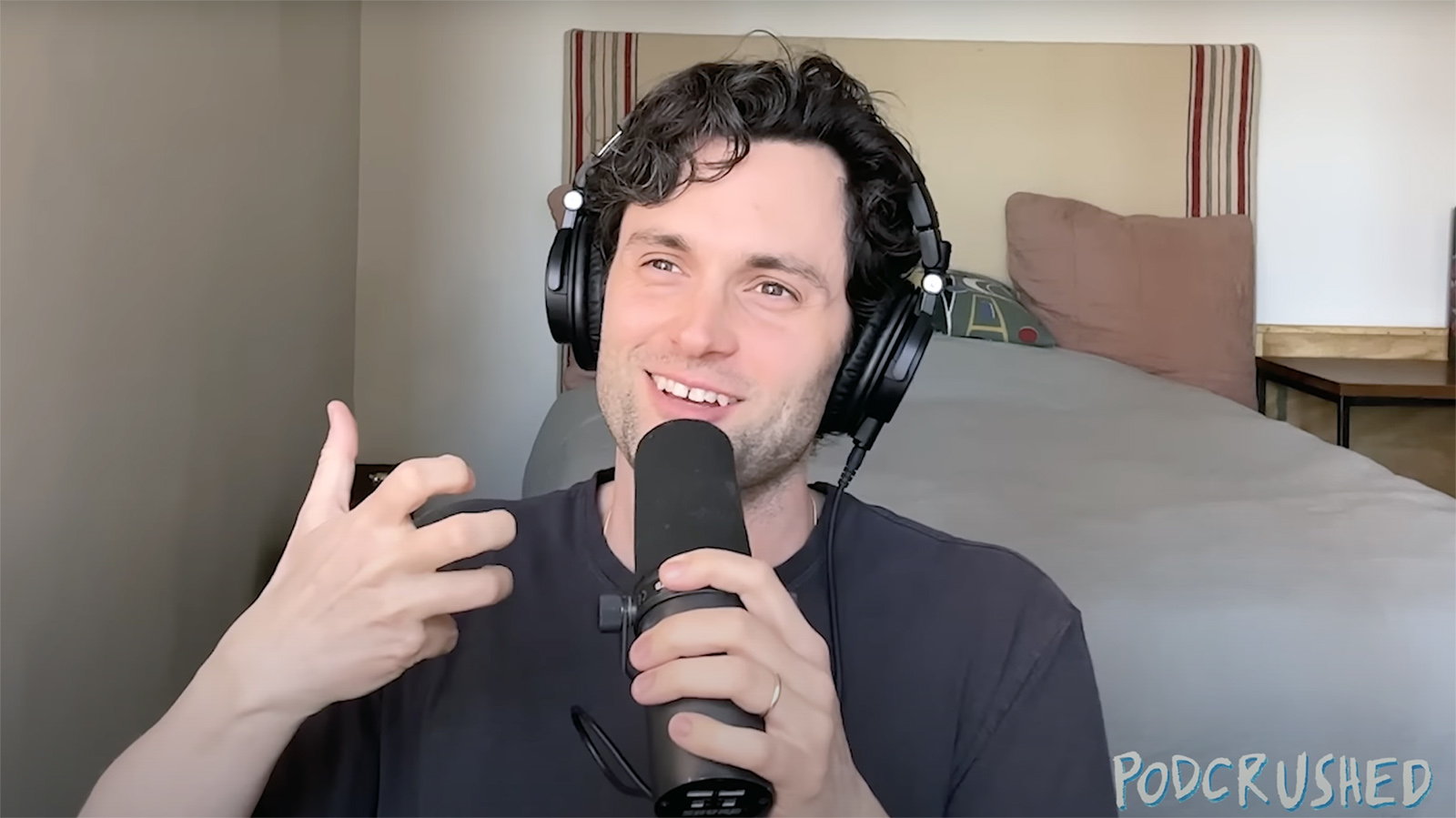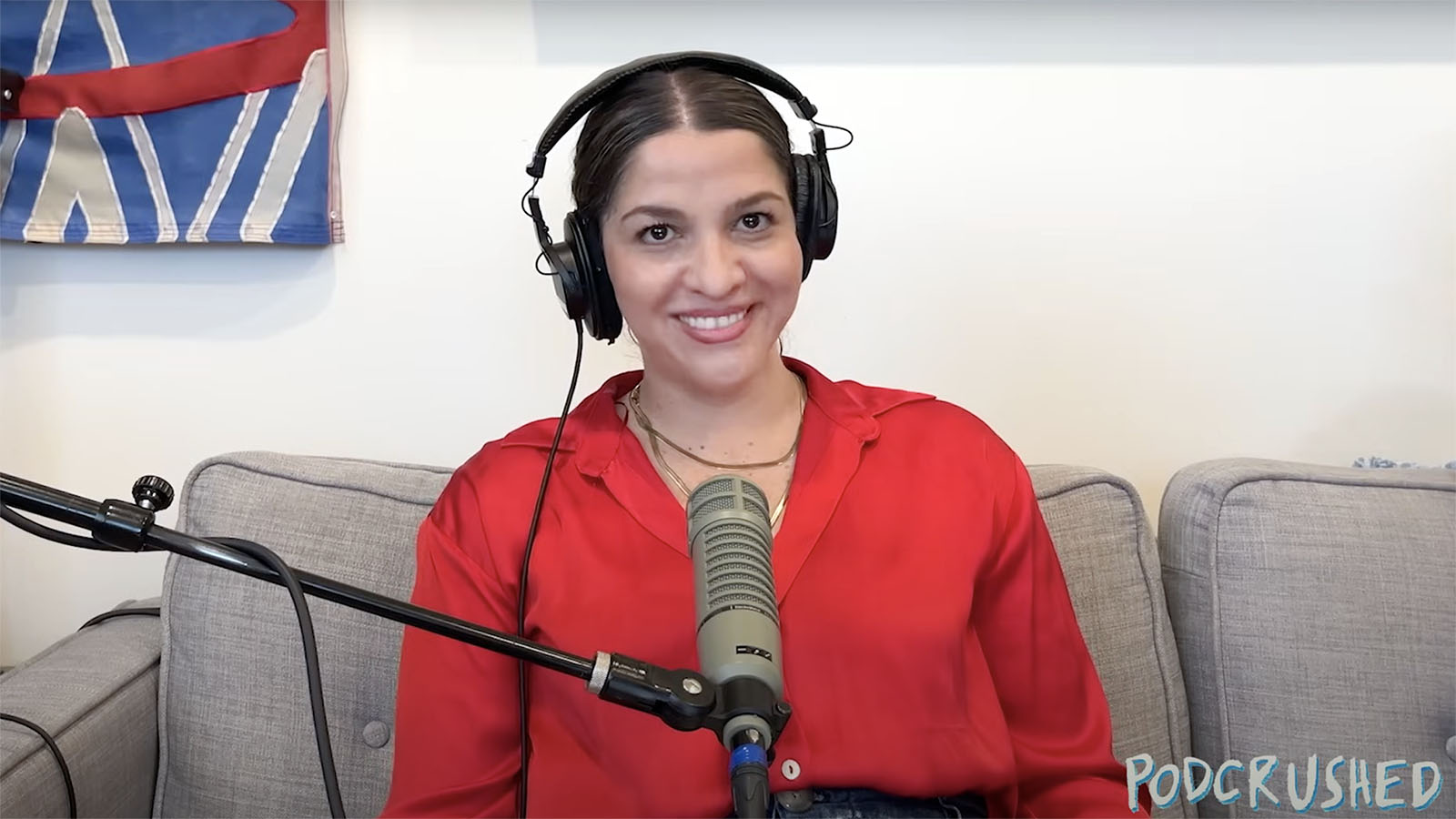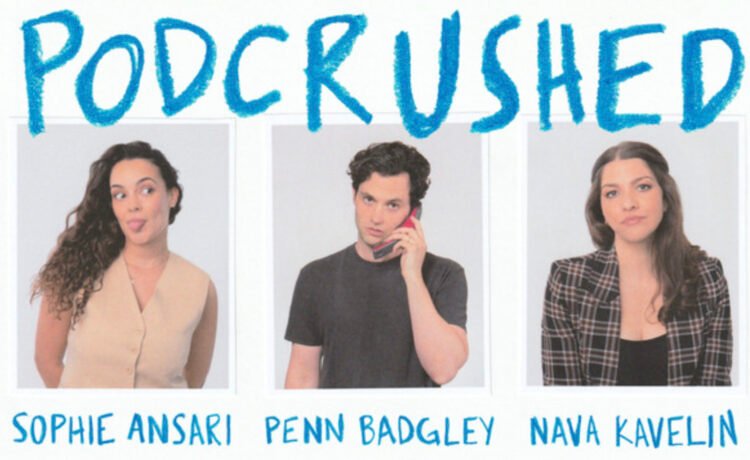(RNS) — When listeners tune in to “Podcrushed,” they might hear that pop star Ariana Grande as a child hosted a birthday party to celebrate Jim Carey, that rapper Saweetie loved author Louis Sachar’s Wayside School series or that actor Julia Louis-Dreyfus cringes when she remembers doing a bit about her Kotex pad at a middle school dance.
It might take a little bit longer to realize that the three co-hosts who lead the earnest conversations on the podcast all share the Baha’i faith, a religion that emphasizes unity and believes that God sent the founders of various faiths to educate humanity and that each are “successive chapters of one religion from God.”
Penn Badgley, the actor most well known for playing Dan Humphrey in soapy teen drama “Gossip Girl,” and Joe Goldberg, the serial killer protagonist of the thriller “You,” joins former middle school educators Nava Kavelin and Sophie Ansari for conversations about celebrities’ middle-school escapades and adolescent heartbreaks and anxieties.
Before they ever began to think about creating a podcast, Kavelin, Ansari and Badgley met through Baha’i circles. Kavelin, whom Badgley credits with the idea for the podcast, has a deep history of working in Baha’i institutions, including most recently as a senior researcher for the Baha’i International Community’s United Nations office.
Badgley and Kavelin told RNS they hope “Podcrushed” uplifts listeners and shines a light on the brighter side of human nature. This interview has been edited for length and clarity.
Nava, you grew up within the Baha’i faith. What were your middle school years like?
Kavelin: I was born into a Baha’i family, and my family moved to Puerto Rico from the U.S. in part to help the Baha’i community grow in Puerto Rico. So I always had a sense of my religion being a really big part of my identity and why I was where I was. And even though it was my parents’ decision, I always felt like I was really part of that. So religion was front and center on my mind.
It was also present as an othering factor. I lived on an island where I was not the nationality that people were. I didn’t eat the food that people ate, and I didn’t have the religion that people had, in a place where people really strongly identified with Christianity. It was something that I was proud of, but also something that I was embarrassed of, too, if I’m being honest, in terms of, everything about me is different, including my religion. And that felt like the biggest one to not share with other people, so I was always thinking about religion as a middle schooler.
Penn, you did not grow up in the faith. So what was your faith and spirituality like as a middle schooler?
Badgley: I had none. At 12, I moved to Hollywood, literally in Hollywood, not just the state of mind, but the actual place, and I began acting professionally. So, I was being inducted into or indoctrinated by the sort of default religion of our culture, which you could say is, in some ways, quite capitalistic. I experienced it as being without meaning, without purpose, sort of gently nihilistic.
And so those were the years that I started to experience a very widely known and distinct form of malaise, which is due to not being sure that there might be a purpose to existence. Religion is a framework whereby that’s explained and explored and experienced by a religious person, and I grew up alongside almost nobody who was religious as well, and it seemed like a very, very far-away prospect or question.
If anything, I had adopted the Marxist perspective that religion is the opiate of the masses. The older I got and the more outspoken I learned to be, I would, if anything, denounce religion.

Penn Badgley records an episode of “Podcrushed.” (Video screen grab)
Do you remember the first time you heard about the Baha’i faith and when it became clear it would be your spiritual path?
Badgley: I was 24 when I first was introduced, however indirectly to it, by a man who would later become a friend. I was in the rainforest in Colombia, staying with an Indigenous tribe there, the Kogi tribe, and I met a Baha’i.
I would later declare my faith as a Baha’i and formally enroll and become a Baha’i at 28, so it was a four-year period, but only, I would say, one of those (years) I was consciously exploring and investigating the faith.
What was it that drew you to the Baha’i faith?
Badgley: It’s the most significant decision I feel, next to getting married, and those two stand side by side because they’ve both informed each other so much.
The writings of Baha’u’llah first were planted in the seed of my heart at 24 and would then root and grow over time.
There’s a document written in 1985 called The Promise of World Peace, which is written to all the peoples of the world by The Universal House of Justice (the Baha’i governing body). What I experienced then, and probably think still now, is just the most far-reaching, comprehensive, in-depth and soul-stirring analysis of the state of the world and its crises that it’s facing, naming the source of the problem and also able to prescribe the remedy, as enacted by this set of community-building plans that the Baha’is engage with all peoples all around the world.
For me, it became a conscious decision, alongside the arc from Occupy Wall Street to Black Lives Matter. I was very engaged in protesting and thinking a lot about political change, social change, the transformation of the society and how and what the individual has to play in that. I was able to make the link between my own personal transformation and that of the world around me.
Nava, since you were in middle school, how has your faith changed?
Kavelin: I feel like any relationship ebbs and flows. So you have periods where it’s more intense and periods where it’s just not as intense or it’s not as on the forefront. I’ve thankfully not yet had a period of my life where I was really in heavy doubt and wanted to abandon my faith, but I feel like it’s more tested.
When you’re younger, at least for me, a lot of my faith was also modeled on my parents having strong faith and being really engaged in the community, and I would go with them to activities. I didn’t resist. I wanted to be part of the community. But now everything I do is of my own volition.
Did your faith play into deciding on the format of “Podcrushed”?
Kavelin: It’s probably impossible to separate being Baha’i from how I think and move in the world and the same for Penn and the same for Sophie, so probably it does. But I think what it informed was the topic. In the Baha’i faith, there’s a really strong emphasis on education and different entry points for education. And in particular on tween education, like 12 to 15 being such a formative time in life that period shouldn’t be overlooked and that it is overlooked too much.
And that what happens to us at that age is so significant that as a global community, we’re trying to learn more about what are the pillars that are necessary for a young person as their brain is really crystallizing in certain ways that will never be reversed, what needs to happen, who needs to be a part of your community, who are the mentors, how do you develop yourself artistically, athletically, with an orientation toward service, intellectually.

Nava Kavelin records an episode of “Podcrushed.” (Video screen grab)
So I feel like as a global community, we think about that time period, maybe more than any other community that I’m aware of. That’s definitely informed “Podcrushed” thinking about those years and wanting to know more about people at that age. So I would say that’s a direct influence of the Baha’i faith’s concern with the moral and educational development of our youth.
Badgley: Yeah, I would definitely agree the most influence it’s had is on the subject matter and our kind of conduct on it. Not that we’re perfect at all. Like for instance, we even thought at one point, “Should we swear?” Because interestingly for quite a long time after I became a Baha’í, I naturally stopped swearing. I resumed once I began working a lot again in the belly of the beast. It’s just sort of maybe a bit too deeply ingrained in me for me to lose before I get older.
Choosing subject matter, the conference where I met Sophie (Ansari) was specifically for people having just exited this period of life, 12 to 15, which we call a period of junior youth, and in that period you’re in need of and desiring, at the soul level, a unique phase of empowerment, which is spiritual at its foundation.
At 15, you’ve kind of entered the age of spiritual maturity. And one of the first things you do in that stage is you think about how you can turn right back around and help empower those people just entering that period that you just went through.
We call people who do this animators, because they’re not so much mentoring or teaching or tutoring, but they’re animating the potential of these junior youth, the qualities of God they already have in them.
So that concept and all the materials in the Baha’i writings around that, it was kind of like me becoming a Baha’i for a second time, and I felt so on fire and so inspired because I was receiving at 12 to 15 years old, the profound opposite. I now in my maturity can look back and say those were absolutely the darkest years of my life, 12 to 20 really.
For the first several years of becoming a Baha’i, the materials around the spiritual empowerment of junior youth and the program itself was such a vital part of me recognizing how to apply the Baha’i teachings in a way that felt so meaningful. When Nava had the idea for the podcast, I was like, (it) just makes so much sense to reflect on this period of life.
Was there ever a conversation about how much to talk about your faith on the podcast?
Badgley: We’re always talking about it.
Kavelin: We didn’t start with those conversations. We would just talk about our faith. Initially we had standard questions we’d ask the guests, and one of the standard questions was to tell us about their experience with religion growing up or if they had a faith practice. And we maintained that for two seasons and then we dropped it this season. I don’t even think it was a conscious choice. It just happened.
We have to be honest, transparent. We have had explicit conversations about it where there’s been times where we’ve gotten really into the depth on a certain topic, and then we’ve had a producer feel like it’s too much. This is not a religious audience.
And so we’ve had to talk about, “Do we agree? Do we not agree? What are the principles involved?” Also, there aren’t that many Baha’is in the media. So this is also a show that does offer representation for a community that is barely represented, so that is a factor for us that might not be a factor for a producer. So it does come up, but it wasn’t a plan from the outset, like we will or won’t talk about our religion. It was like, no, like we’re going to talk about our lives. If our religion is part of a story, then we’ll tell it.
Badgley: Certainly for the three of us, we can’t separate it, as Nava said before, from any part of our lives. If I’m to tell a story authentically about how I came to the decision of playing Joe Goldberg, the clearest, most transparent version of that story very much includes my relationship to the writings of Baha’u’llah.
If we’re talking about Nava’s mother, who’s passed, and how she grieved in that time and how she thinks about it now, the most authentic and most direct, simplest way to talk about it, it’s going to include her relationship to teachings of Baha’u’llah.
Ideally what we do, if we’re doing it well, we just treat it like a conversation with friends. We think of the listeners as friends, and any friend who knows you well, eventually comes to know this about you, you know?















